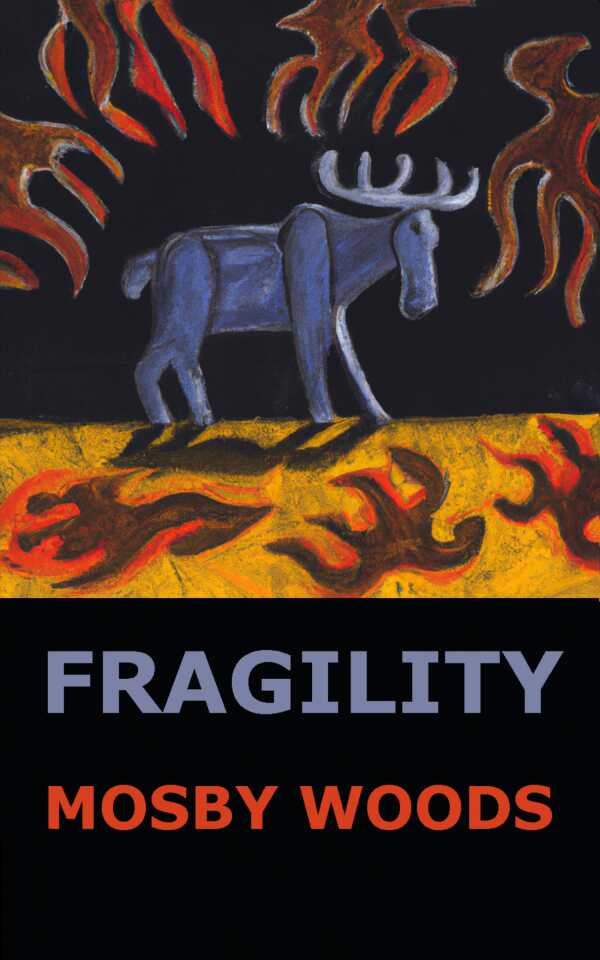
Fragility
Language is under constant interrogation and scrutiny in the acerbic, pandemic-set satirical novel Fragility.
In Portland, Oregon, during the early days of COVID-19, the characters in Mosby Woods’s illustrated speculative novel Fragility peer into an abyss of the absurd.
Fragility opens during Portland’s citywide quarantine as surveillance workers confiscate a collection of dictionaries from the unnamed, etymology-obsessed narrator. This is only the beginning of the language policing in the narrator’s masked and anxious environment. But his life is given purpose and power when the godlike Masked One commands him to write and “disrupt the dominant discourse.”
The narrator is charged to engage in psychic surveillance, projecting into the waking and sleeping minds of others to witness their acts, moods, and dreams from anywhere. His energy is renewed by these tasks. Then he’s asked to follow Basilica, a corporate diversity officer and discourse participant, and her family. When Basilica talks with her teenage daughter about going to a concert where seats will be taken up by ferns to separate audience members from each other, the narrator recognizes Basilica’s internal parenting anxieties as well as her daughter’s internal resentments.
The story is challenging throughout thanks to the unreliable narrator, whose words sometimes seem as suspect as the words he analyzes. He portrays himself as a powerless wanderer who relies on a landmark bronze statue of an elk to keep his bearings. There’s irony, therefore, in the fact that he is cast as the book’s all-seeing consciousness and is in control of the narrative. Further, he recognizes little unity in the lives of others: people herein are alienated from one another and confused about the nature of their relationships. As the Masked One explains, “There is no objective truth, no shared mythology.” In a reversal of course, the narrator is told to “become [Basilica’s] subject”—a fundamental shift whose implications are kept ambiguous.
There’s vigor and intensity to the novel’s language, and language is under constant interrogation throughout. The narrator muses on etymology; others critique language and their understanding of it. At one point, Basilica fights “her belief that genderqueer was an empty word of generational posturing.” On the flip side, terms that Basilica and other diversity trainers use in their professional lives, including “decentering privilege,” come under scrutiny from others. Elsewhere, Basilica’s husband knows that he’s a twenty-first-century man because he has “let himself become an invention for the convenience of women by women.” In such instances of verbal scrutiny, and later as Portland falls toward an anarchist revolution, the novel reaches toward, but evades pronouncing definitively, charged political statements—for example, suggesting that the imagined past in which values were shared is preferable to the contemporary chaos.
Over five hundred black-and-white illustrations complement the text. They sometimes reveal helpful details, as when Basilica’s husband is described as dolphin-like and the accompanying illustration reveals his sleek, curved body. More often, though, the illustrations are superfluous against the text, which brims with its own descriptive, synesthetic language: “So much ink filled the trees’ newspapers. Caw-caw, the ink yelled.”
Fragility is a novel that uses stunning imagery to question the intersections of language and reality.
Reviewed by
Michele Sharpe
Disclosure: This article is not an endorsement, but a review. The publisher of this book provided free copies of the book and paid a small fee to have their book reviewed by a professional reviewer. Foreword Reviews and Clarion Reviews make no guarantee that the publisher will receive a positive review. Foreword Magazine, Inc. is disclosing this in accordance with the Federal Trade Commission’s 16 CFR, Part 255.
